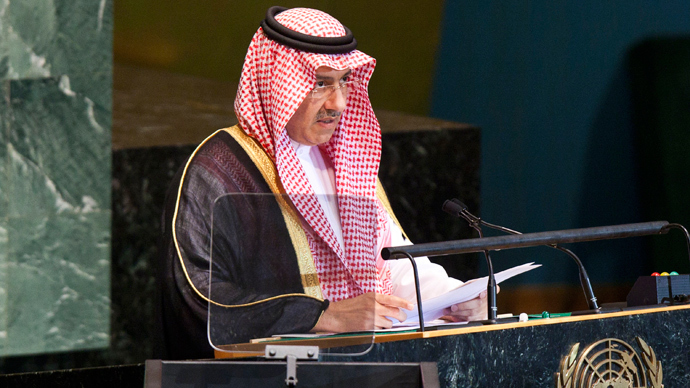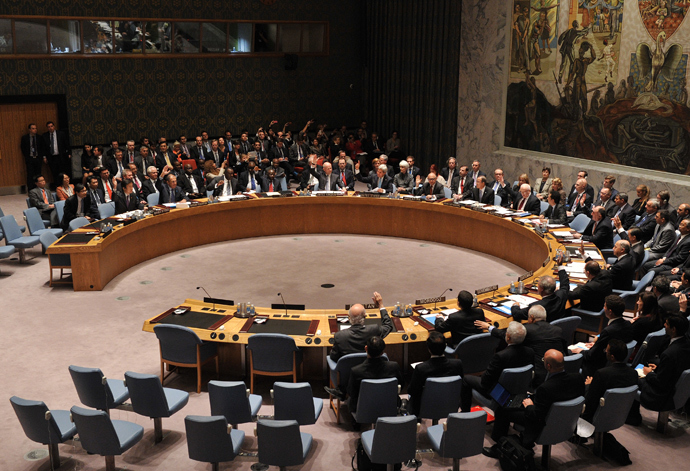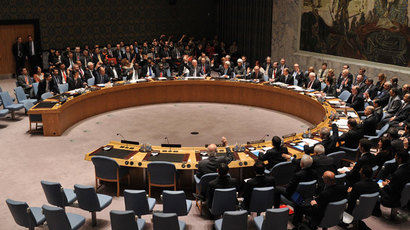Saudi Arabia rejects UNSC seat over ‘failure to deal with conflicts’

Saudi Arabia, an advocate of foreign military intervention against Syria’s government, has rejected its rotating seat on the UN Security Council, saying the body cannot deal with international conflicts.
The Gulf kingdom for the first time won on Thursday a place among
non-permanent members of the top international security body,
along with Chad, Chile, Lithuania and Nigeria.
But a day after an election at the UN General Assembly awarded the position, Saudi Arabia rejected the honor.
"The kingdom sees that the method and work mechanism and the
double standards in the Security Council prevent it from properly
shouldering its responsibilities towards world peace," Saudi
foreign ministry explained the move in a statement.
Riyadh mentioned the Syrian conflict and the Palestinian-Israeli conflict as examples of the UNSC’s failures to ensure world peace. It also cited its inability to transform the Middle East into a zone free of weapons of mass destruction, an apparent reference to Israel’s alleged stockpile of nuclear, chemical and biological weapons.
However, UN General Secretary Ban Ki-moon said on Friday that he
has not yet been officially notified of the decision, adding that
it would be up to UN member states to decide how to replace Saudi
Arabia.
The Saudi move has caused mixed reaction around the globe, with
some nations criticizing the Gulf state, while others are finding
some harsh words to say about the way the Security Council
operates.
By rejecting its rotating seat on the UN Security Council, Saudi
Arabia has removed itself from collective work on maintaining
international peace and security, the Russian Foreign Ministry
said.
Moscow stressed that it’s “puzzled” by the argument, which
the Gulf state provided in order to justify its
“unprecedented” move.
“Reproaches to the UN Security Council in context of the
Syrian crisis sound particularly strange as the Security Council
unanimously adopted Resolution 2118, which forms the legal
framework for a comprehensive settlement of the conflict in
Syria,” the foreign ministry explained.
France, on the other hand, has backed Saudi Arabia's stance on
“double-standards” in resolving conflicts around the world,
similar to the one in Syria, in the UN Security Council.

"We have an ongoing dialogue on the subject of Syria with
Saudi Arabia. We share its frustration after the Security
Council's paralysis," said French foreign ministry spokesman,
Romain Nadal, adding that Paris is proposing reforms to the
council's veto rights.
Turkey also used the Saudi withdrawal to lash out at the UN,
accusing the international organization of being infective.
"The United Nations are losing quite a lot of their
credibility," Turkish President, Abdullah Gul, is cited as
saying by the Dogan news agency.
"I understand that Saudi Arabia's decision aims to draw the
international community's attention to this situation ... We must
respect their decision," he added.
Meanwhile, the UN is beginning an accelerated process of finding
a replacement for Saudi Arabia in the UNSC, which will also come
from the Asia-Pacific region.
The General Assembly would have to approve the new Security
Council member before January 1, 2014, when the occupying
rotating seats will begin executing their duties, Afaf Konja,
Spokesperson for the President of the 68th Session of the UN
General Assembly, said.
The Saudi
diplomatic demarche comes weeks after the Security Council passed
a resolution which supports a Russia-brokered deal under which
Syria revealed its chemical weapons stockpiles and agreed to
destroy them.
The disarmament put on hold US plans to use force against
Damascus in response to the use of chemical weapons near the
capital in August.
A group of international inspectors is currently working in Syria, destroying its chemical weapons capabilities. It has so far verified half of Damascus’ information on its stockpile. The process of destruction of the arsenal is already underway.
Saudi Arabia, which sponsors rebel forces trying to topple Syrian
President Bashar Assad, has criticized the development. Earlier
it rejected its right to address the UN General Assembly in a
protest against inaction in Syria.
The UN Security Council is authorized to allow use of force on behalf of the international community for the sake of global security and preservation of peace. There are five permanent members of the council – the US, the UK, China, Russia and France, which hold veto power on the council decisions.
Ten non-permanent members, which cannot block UNSC draft resolutions, are elected to serve two-year terms.
Critics of the body, which was formed after World War II, has
long accused it of inability to act in situations where interests
of permanent members are in conflict with each other. In the
Syrian crisis the US, Britain and France all advocated supporting
the rebels, while Russia and China opposed them.














